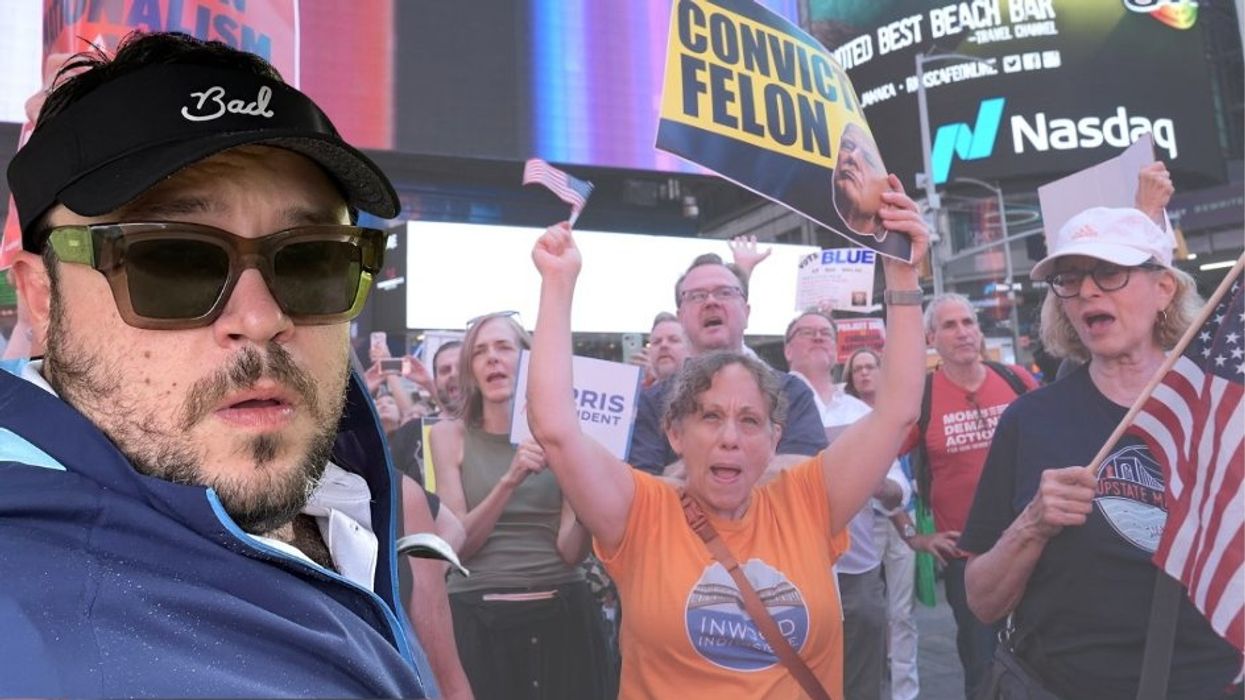
Ben Bankas/Anadolu/Getty Images

A night in Tulsa with the Trump-loving Canadian comic the left loves to hate.
Ben Bankas pondered fascism as he waited for the Cybertruck.
His enemies on the left have branded his comedy “right-wing fascist” bigotry. They’re not entirely wrong: He is right-wing, and his comedy is bigoted. One of his taglines is “I’m racist.” And there’s his Chinese human-monkey hybrid character:
Bankas radiates a kind of unpredictable energy that either offends or enthralls people, as tonight’s crowd would soon discover.
But does that really make him a fascist?
Bankas slumped in a black hoodie on a bench outside the Hampton Inn where he was staying. November darkness had descended over Tulsa, layering the air with an autumn cold.
He sprang up when the metallic shape of my friend’s Cybertruck glided into view. Everyone in the parking lot froze and gawked. A mother yanked her curious child away from the vehicle, muttering about bad people.
“Definitely a Kamala voter,” said Bankas as he slid into the back seat. “Anything Elon does is automatically fascist to liberals, and she is definitely a liberal.”
He immediately began chattering with my two friends, as the official photographers.
Two days earlier, Donald Trump had won the 2024 presidential election. And now Bankas was in Oklahoma, where every county has been Republican since 2000, so people were even happier than normal. In my little town outside Tulsa, people set off fireworks every night for a week.
Bankas, a Canadian, recently moved to Austin, Texas. He was happy with the Trump win. For one, he has a toddler, a little girl, and a baby boy on the way. Liberal nonsense is personal to a family man.
At 32, he feels a growing presence, the itch of fame and its potential, amplified by the buzz from the release of his fourth special, “Elect This."
Early in his career, he was inspired by Trump's statements about how the cure for depression is just working really hard. He thinks about it any time he wants to rest, like earlier that day, when he took an afternoon nap.
On the drive to the Loony Bin, Bankas asked about Oklahoma, pulling out tidbits of local culture that would reappear in his set. Any anxieties were offset by the shiny, almost alien presence of the Cybertruck gliding through Tulsa’s quiet streets.
The recent change back to Standard Time made everything darker, just a smidge off-kilter. This intensified when we arrived at the Loony Bin, which occupies the gap between a Halloween store and a Cinergy, with a whiff of Red Lobster.
The crowd in the lobby went quiet as we entered, heads turning nervously, maybe stealing a glimpse of tonight’s headliner.
It’s hard to tell, in part because Bankas, as a persona, radiates a kind of unpredictable energy that either offends or enthralls people, as tonight’s crowd would soon discover.
Stout and forward-tilting, Bankas resembles a warthog of a running back, swift but still fond of a bit of cruelty.
In the greenroom, we raided the beer fridge. Soon, the coffee table succumbed to empty Miller Lights and recording equipment. Within ten minutes, we had to start a tab.
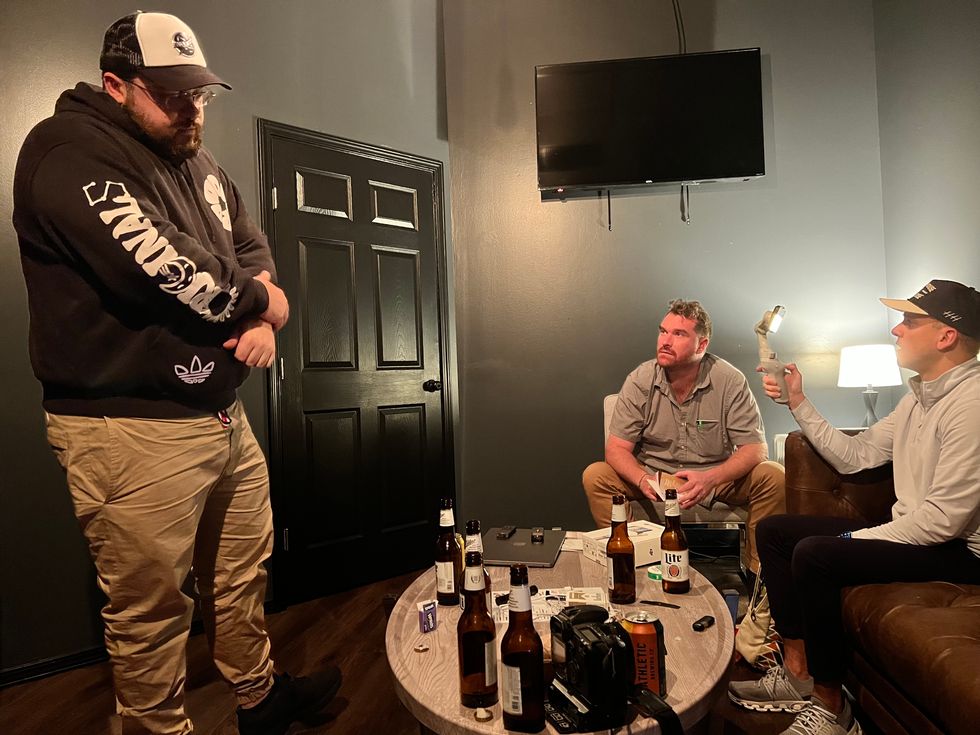
The club owner told us his unbelievable origin story, so traumatic that it was confusing. He and Bankas shared a few winky jokes, but moved on to small talk about various comedians. Later, the owner would complain that he had actually lost money on the show. He probably did, but it was hard to tell what he really meant.
My friends were amazed by how normal Bankas was. One of them kept forgetting that the occasion was a proper interview. To be fair, we all did, and by the end of the night, the waitress at the steakhouse said, “Lord have mercy I’m about to earn my money.”
The only usable part of our interview came before Bankas walked out of the greenroom and onto the stage. A few cigarette breaks, some more beers, lots of pregame pacing — he was calibrating the chemical and physiological equation for a feverish set.
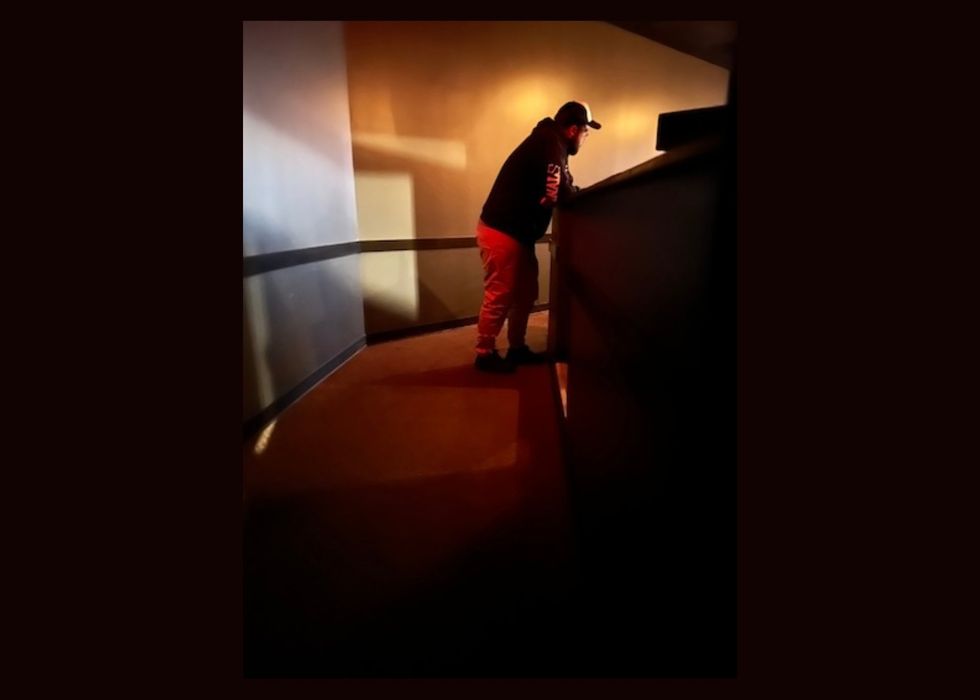
This was his locker room, and he was about to step out into the light and compete. That shakes anyone up.
"It's not always about being funny," he confided. "It’s about not screwing up."
His muffled anxiety made him more likeable, a vulnerability that contrasted sharply with his persona as a flamethrower who lives to offend. Defenses down, he talked about his childhood and his mother.
He mentioned how he played the violin as a kid but quit because he thought it was "gay."
He added, “It was just me and a bunch of Chinese kids, and my parents made me wear stupid sweater vests with a turtleneck.”
Freed of his stuffy winter outfits, he joined the hockey team, “because that's where all the cool kids were.”
Oddly enough, the position he played was left wing. But he also briefly played defense and scored a ton of goals, a dynamic that appears in his comedy: Even when he’s receding, he’s thirsty to attack.
After high school, Bankas played hockey at various levels, including single A, which he described as “just a bunch of people who thought they were gonna go to the NHL and be a**holes.”
He still plays sometimes, but not competitively since college.
Then he said, “I used to sell photocopiers.” He repeated the sentence. And again. After a pause: “I lied on my resume.”
Bankas’ opening act was a laid-back and delightful local comedian who also shot video footage at the club. His routine was clean — a lovely performance.
Loony Bin’s room seats 250 people, but that night, only about fifteen showed up. And they were all crowded around the stage.
Bankas peeked out of the greenroom: “Is that everyone?” he asked, then returned to the pre-fight hype session, an iPod in one ear blaring feel-good rap. The warthog was ready to feed.
His entrance song puttered out of the house PA like the horn of a lowrider: “Can’t Take a Joke” by Drake. He paused for a couple of moments, as if he expected the audio quality to improve.
Once onstage, Bankas suppressed an “uh-oh” as the shape of the stage and the angle of the lights and the closeness of the crowd collided with his buzz from beers and Zyns.
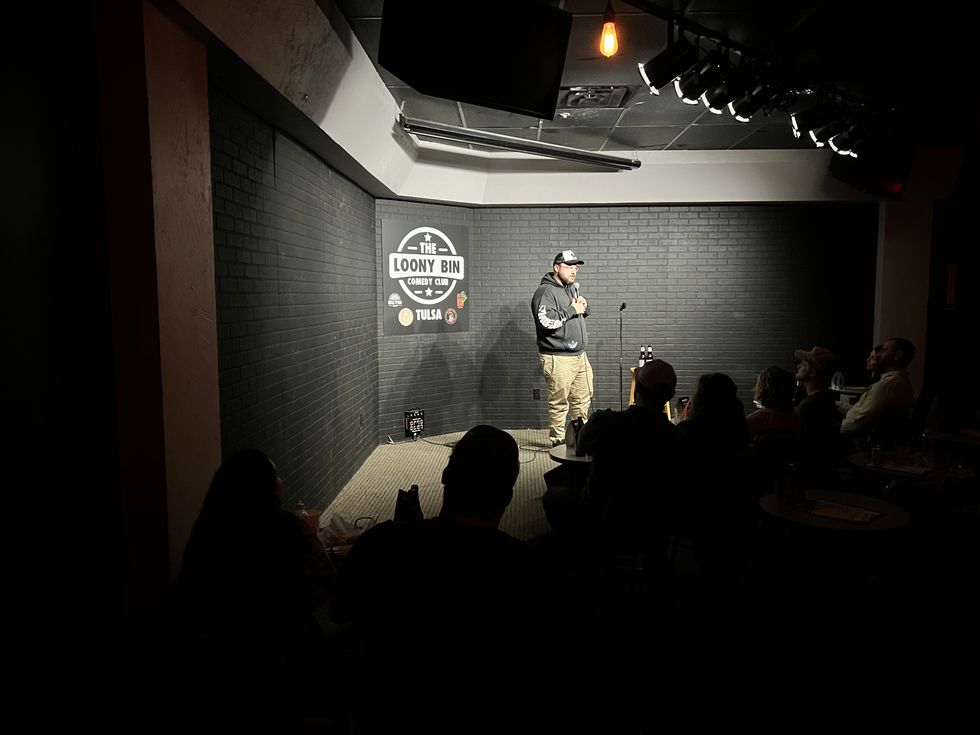
His opening joke was more of a hemorrhage than a show-starter: “People have lost some f***ing minds because Trump won! And all the retarded people don't understand what's going on. By all the f***ing dumb women — the female, homosexual part of our society, right? They're all dumb, retarded, gay people and f***ing women that get like 40 abortions before they’re 30 years old.”
It just plopped out like vomit.
He was testing new material, following the recent release of “Elect This.” This should have been a neat moment when the audience gets to witness a comedian honing his craft.
Instead, he got sloppy. He told some great jokes. But the performance lacked flow, and Bankas had no poise.
Usually displaying great timing, with his pauses and sentence fragments, tonight Bankas fumbled through his material, prodding at his iPhone mid-set to scroll through notes. Dead air, marked by the unique silence of people looking down and scrolling.
This kind of set only works if the comedian steps away with an air of humility. “I failed a lot during that set, but I think I made some headway for the next special.”
Instead, Bankas leaned into warthog mode.
About 15 minutes in, he abruptly shifted to the audience. He’s known for his crowd work, especially hecklers. But tonight there was no heckling and hardly any crowd. Just a little gathering of friendlies, eager for a laugh on a Thursday night.
So Bankas torched them.
Over the course of his 90-minute set, the mood in the room soured.
Bankas berated a guy, an engineer. For the rest of the show, he didn’t laugh, and his wife occasionally rubbed his back supportively. I spoke with several audience members who felt the same.
Bankas’ meanness seemed like a crutch, a way to distract the crowd from his fumbling. And this approach was incredibly alienating for someone eager to build a giant audience. But he didn’t seem to notice this.
He believes that he should be part of Joe Rogan’s collective of famous comedians. Maybe he should. He mentioned Rogan a lot throughout the night. He actually closed his set by promising to fill the room next time he comes to Tulsa and to bring Joe Rogan with him.
Bankas’ vituperative style has roots in hockey locker-room vulgarity and rebellion, which emerged when he attended Harbord Collegiate Institute in Toronto, a school known for the actors, comedians, and academics among its alumni.
His mom was a high school teacher. He threw wild parties at his house.
“The black kids loved it,” Bankas told me. “But they'd also trash … not really my house, but they'd run along cars on my street and just trash every car, and the cops would show up. Everybody was trying to sue my mom.”
His friend Jamal was one of the first people to compliment Bankas’ sense of humor, impressed by Bankas’ willingness to shout the N-word.
Bankas’ early career took him from Toronto’s local comedy clubs to his first professional gig in Sudbury, Ontario, where he performed in a sports bar and spent the night at a Super 8 motel.
In the polarized ecosystem of modern stand-up comedy, where subtle hints of conservatism used to be cloaked with disclaimers, Joe Rogan’s endorsement of Donald Trump marked a breakthrough. Comedians like Shane Gillis, Theo Von, and Tony Hinchcliffe also played a crucial role.
From the start, Bankas rejected this neutrality, planting himself squarely in the anti-woke camp without a whiff of hesitation or apology.
Bankas doesn’t just poke fun at liberals; he dismantles the “woke” worldview with a sledgehammer and finds humor in the debris. For him, the self-righteousness of progressive culture is a gold mine of contradictions.
These moralists are obsessed with identifying oppressors and victims yet fail to see their own hypocrisy. They denounce wealth but worship celebrity, preach representation while silencing dissent, and demand inclusivity but shame anyone who doesn’t comply with their dogmas.
Something about the way they squeal and whine amuses Bankas. He likes to see how far he can push the boundaries before they spaz.
Take Bankas’ own brief foray into politics. During a run for mayor of Toronto, he donned a rainbow suit and tie on the campaign trail, promising to “make Toronto fun again.”
He ran on a platform of unapologetic offensiveness, an approach that earned him a few hundred votes and the undivided attention of the Toronto Sun. His candidacy was a joke, but it was a joke with teeth. He had brought his anti-woke philosophy from the stage and unleashed it on the real world.
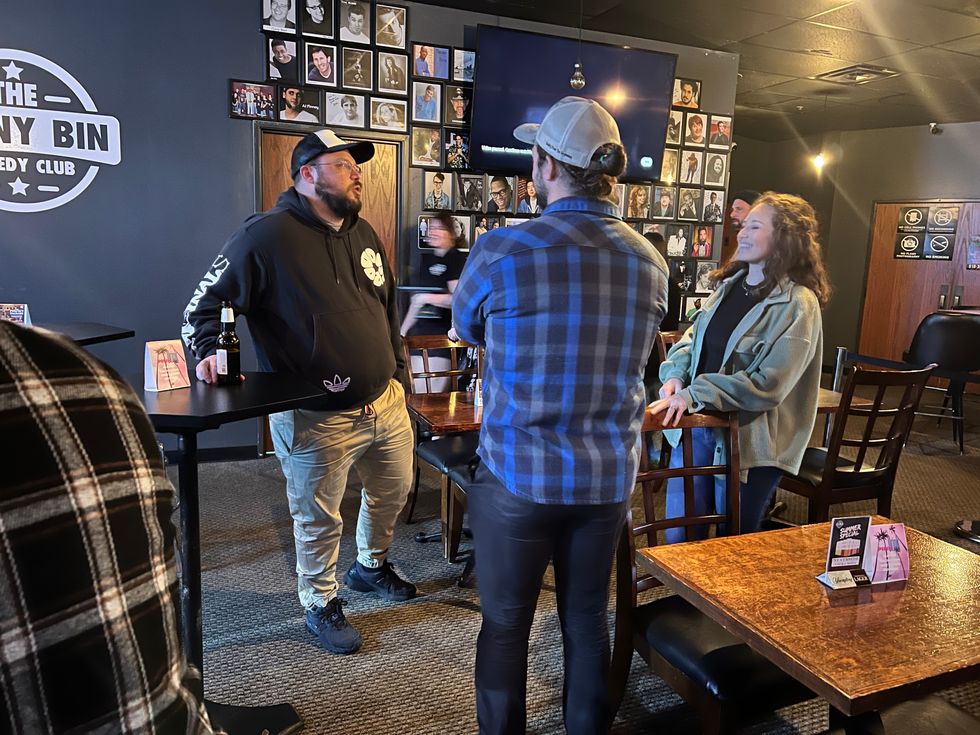
Back in the greenroom, Bankas was revved up like a prizefighter who just earned a belt. After a quick meet-and-greet, we all piled back into the Cybertruck and set course to B.J.’s Restaurant & Brewhouse. Bankas hadn’t been there, and I had promised steak. Everything fell apart after that, in an uninteresting way.
But the drive there was peaceful. No jokes, no laughter, just a glide, a drift.
“Turn on the Lights” by Future blared from the speakers. Windows open.
We floated through each quiet silhouette of Tulsa at night. Golf balls of cold air rushed into the Cybertruck. The pale yellow fabric of street lights flashed at us like paparazzi.
I think, ultimately, I liked him, but he did make fun of every single person he interacted with all night, including me, repeatedly, with a bravado that I admire.
He wrestles with the offensive-funny ratio I wrote about in my profile of Gavin McInnes.
Offensive comedy is dangerous and beautiful. The more offensive the material, the funnier it has to be, a rule that Lenny Bruce, Richard Pryor, and George Carlin cemented.
But Bankas constantly risks excess that would make his offensive words hackneyed, much like the brilliant Ricky Gervais.
Bankas is an incendiary comedian with a talent for crowd work, but he’s still a few steps away from takeoff. It’s time for his comedy to mature. What his performance lacks most is storytelling. He needs to build scenes, characters, and anecdotes. Not by softening his approach, but by grounding it. A strong offensive joke doesn’t just shock; it spotlights the human condition.
From there, if he’s lucky, Bankas can become a philosopher-king like Chappelle, Burr, Carlin, and their ilk.
Of course, plenty of talented comics never make this move. Stephen Wright, Dimetri Martin, Mitch Hedberg, and Rodney Dangerfield all excel with one-two punch blitzkrieg delivery, but even they weave story into their sets.
In a world where liberal and conservative comedians are waging war over who gets to define what’s funny, Bankas’ commitment to punching in every direction reminds us that culture is athletic, something we have to engage with and perform.
The left wants Bankas to be held accountable; the right wants to claim him as its own, but Bankas resists either label, for the most part.
As a provocateur, his persona thrives in the tension between the audience’s expectations and his own refusal to cater to them. His persona doesn’t want applause; he wants the visceral response, the kind that shakes people out of their comfort zones.
Comedy has always had a communal aspect, a way of determining who belongs. Laughter is the signal; if you laugh along, you’re in on the joke.
So you either laugh with Bankas, signaling your willingness to challenge boundaries, or you sit stone-faced, unamused, excluded from the insiders’ club. This is the essence of Bankas’ style: communal in its alienation, cannonball architecture.
At a glance, this maneuver looks straightforward. But Bankas is pulling a ton of levers. Imitation is fundamental to his process. Mimicry can easily spike the offensive-funny ratio, especially if the impression features any kind of failing or disfigurement — terrain that Bankas uses for joyrides.
Henri Bergson observed that deformity is funny only when it can be convincingly mimicked by someone who is able-bodied. But this decree takes us right back to beauty of comedy’s paradox: The only comedians who can say “retarded” are the ones who can imitate retardation.